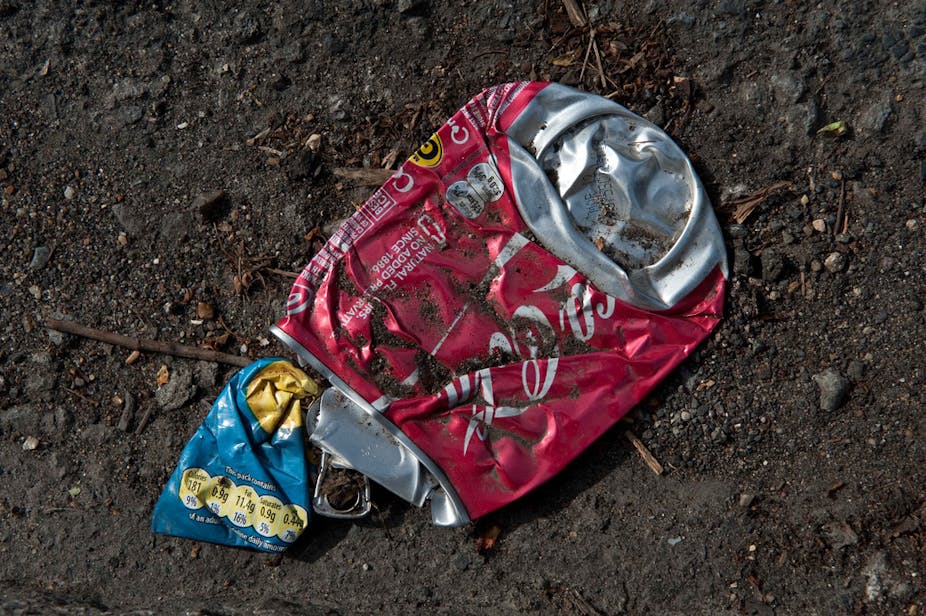A reported 10 billion drink containers are thrown away in Australia every year. Many of these are recycled, but many end up in landfill, on roadsides and in waterways.
The danger posed to wildlife by plastic waste is well documented, as is the life of non-biodegradable waste in landfill or the landscape. Beverage containers comprised 38% of the waste collected on the 2012 Clean Up Australia Day. Despite these containers being recyclable, they are still ending up in our urban and rural landscapes.
A heightened awareness of waste and recycling has put a strong public focus on container deposit legislation (CDL) schemes as a means of reducing the amount of glass, plastic and aluminium going into landfill or the landscape.
The basis of CDL is that consumers pay a refundable deposit on drinks sold in recyclable containers, and can redeem the deposit by returning the container to a range of points, including retailers and recycling depots.
South Australia instigated a CDL scheme in 1975 with a refundable deposit of five cents on recyclable drink containers. The deposit was increased to ten cents in 2008. Over a number of years other states and territories have investigated the application of the scheme and, in an effort to address waste in the Northern Territory, the Territory government passed their own CDL scheme in 2011.
Public approval of the CDL scheme in South Australia is very high, at around 98% and there is considerable and growing support for similar schemes in the other states.

The waste stats demonstrate the scheme’s success in reducing plastic and glass litter: the 2012 Clean Up Australia Day Rubbish Report shows that plastics made up just 28% of total rubbish collected in South Australia, whereas in NSW and Victoria, where there is no CDL scheme, plastics amounted to 38% and 34% respectively. Similarly the proportion of glass collected in SA was about half that collected in NSW and Victoria.
After the introduction of the Northern Territory’s CDL scheme last year, multinational beverage giant, Coca-Cola Amatil (CCA), announced that it would mount a legal challenge against the scheme. The reason provided by the company was that it didn’t want to see Territory households pay up to 20 cents extra for drinks when the deposit was factored in along with the administrative charges for the scheme.
Such concern for struggling families by one of the world’s largest corporate giants was touching, in the same way as a crocodile’s concern for a lone swimmer in a Kakadu waterhole is touching.
As well as Coca-Cola and its diet variations, CCA also owns Fanta, Mountain Dew, Lift, Sprite, Mother, Powerade, Pump water, Mount Franklin water and the Kirks and Becks brand drinks. Its share of the Australian soft drink market is around 56%, as well as 45% of the sports drink market and 25% of the bottled water market. At stake is not the household budgets of Territorians, but the profit margin of the company if consumers respond to a price rise by buying less of the product.
The legal grounds for the challenge was the Commonwealth Mutual Recognition Act 1992. The Act was passed in order to ensure that goods and services are provided in all state and territory jurisdictions under the same conditions.
The federal court found that as CCA is selling drinks in containers, the drinks, and not just the containers, are subject to the ten cent deposit. Therefore, as other states – with the exception of SA whose CDL is exempt under the Act as it was in operation prior to the passage of the Act – do not have CDL, then the Northern Territory’s scheme places a condition on drinks sold in that jurisdiction that does not exist elsewhere.
In the wake of the court decision, industrial sabotage activist group, Out Of Order, responded by putting “Out of Order” signs on CCA vending machines in all capital cities. This action has the potential to affect CCA’s profit margin far more than the implementation of CDL in Australia’s least populous jurisdiction.

Coca-Cola Amatil is a multinational corporation with an annual trading revenue of around $47 billion. The Northern Territory has a population of 233,000 and a GDP of around $16 billion per annum.
The Territory’s CDL scheme is hardly going to make a dent in CCA’s profits and the company knows it. The legal case against the Northern Territory’s waste reduction scheme is more about sending a message to other Australian states that may be considering a similar scheme.
The company’s tactic, however, may come unstuck next month when, as anticipated, the Council of Australian Governments (COAG) begins steps towards adopting a plan for a nationwide CDL scheme that will see all states and territories introducing a similar scheme to that which SA has been using for four decades, thus removing the possibility for any legal challenge under the Commonwealth Mutual Recognition Act.

